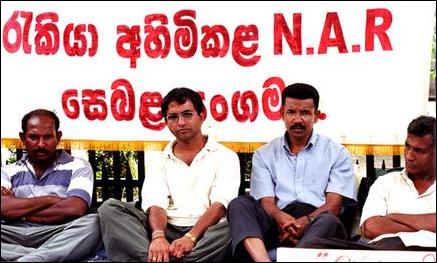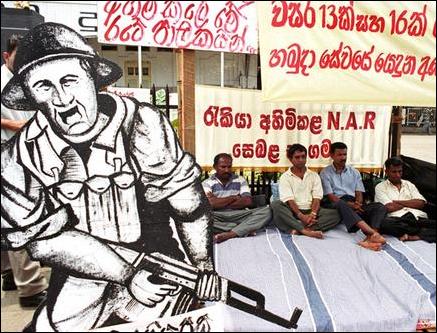
Fasting Sri Lankan soldiers demand fair treatment
[TamilNet, Wednesday, 09 April 2003, 07:23 GMT]
Sri Lankan armed force soldiers who are on a hunger strike in front of the Fort Railway Station in downtown Colombo in protest against their dismissal from service said Wednesday they would fast unto death in batches of four until their grievance is addressed by the Ministry of Defence. This is the first time that soldiers of the Sri Lankan armed forces have aired grievance in a public protest.
Sixty nine soldiers dismissed in 2001 from the National Armed Reserve of the Sri Lankan armed forces say the MoD under President Kumaratunga’s People’s Alliance regime had treated them unfairly. The group began their protest on Monday.
 The first batch of NAR soldiers on a fast unto death
The first batch of NAR soldiers on a fast unto deathStrapped for cash, Colombo is under pressure from many donor countries to downsize the island’s armed forces in tune with the fiscal discipline recommended by the World Bank and the International Monetary Fund.
The fasting soldiers belong to the National Armed Reserve (NAR), a semi –territorial unit raised by the Sri Lanka army in 1986-1989 to supplement the dwindling number of regular forces outside the northeast. The Sri Lanka army raised several units like this to meet its growing manpower needs between 90 and 96.
The NAR was raised by an act of parliament in 1985 called the National Armed Manpower Unit Act (no.40)
Recruits of the NAR were trained by the Pakistan army.
The protesting soldiers- all Singhalese- say that their dismissal was unfair and that the compensation given them by the Ministry of Defence is no commensurate with their service and experience. They say the MoD gave them a few hours notice before their dismissal on 28 February 2002 and that later, each was granted a compensation of 125,000 rupees (approx:1304 USD).
“All of us have 13-16 years of experience as soldiers. We have worked in all parts of the country, including the northeast. We received military training here and abroad. Since our dismissal we have been going from pillar to post in search of justice. We wrote to the President, Prime Minister, Minister of Defence, opposition leader and party leaders. But nobody took note of our plight”, said leader of the protesting soldiers, Mr. I.A.J Pushpakumara.
The Sri Lanka National Guard (SLNG) was the only territorial unit that was integrated into the regular forces in the northeast. (The SLNG comprises ex-home guards and delinquents and drop outs from other regular formation of the Sri Lanka army)

As part of its drive to bolster the army’s manpower with non-regular units, the Sri Lankan government started the National Manpower Unit (SLMU) aimed at recruiting unemployed Tamil youth mainly in the Batticaloa district.
The Sri Lanka army believed that the LTTE was able to sustain its troop levels in the Vanni despite heavy losses during the massive Jaya Sikurui Operation during 1997-99 because of heavy recruitment in this east coat district.
Hence SLMU was set up as a means to draw away potential recruits from the LTTE and to retain them in units on monthly pay. However, the SLMU became defunct in many places and in some was transformed into a civil service organisation after the Liberation Tigers began political work in the SLA held areas of the east.








